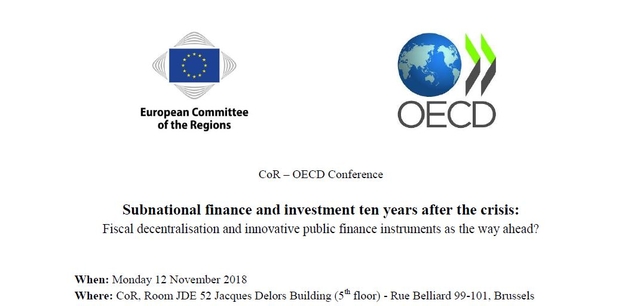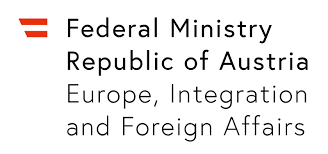Registration
Programme
The European Committee of the Regions and the OECD are organising this event on 12 November and it will focus on the state of subnational finance and investment, analysing limits and request that subnational governments face.
Introduction
The financial and economic crisis which started in 2008 had important and long-lasting consequences on public finances around the globe and across levels of governments. Investment was particularly hard-hit in the EU, as the financial crisis became a sovereign debt crisis and budgets had to be tightened significantly in the face of changing macroeconomic situations and difficult market conditions. As a result, national and subnational governments have seen their budgets constrained. Local and regional authorities were among the first to be affected as transfers to subnational governments fell sometimes sharply as a consequence of budget consolidation plans undertaken in many countries, affecting their investment capacity. Political debates surrounding rules governing public debts and deficits have gained in prominence, as has the question of fiscal decentralisation. Innovative solutions and new instruments have appeared and become more widely used in order to better enable national but also subnational governments to achieve their investment objectives, and ultimately to meet citizens' expectations and demands, but they are not without challenges.
Yet, subnational governments remain the engine of public investment, accounting for over half of investment by the public sector as a whole in the EU. Moreover, local and regional authorities are taking on more numerous and diverse roles with regards to investment, acting not only as investors themselves but also as organisers, regulators, or facilitators in projects involving a diversity of public and private actors.
This joint conference of the OECD and CoR will review the current state of subnational finance and investment, exploring the constraints and demands that they face. It will then look ahead to the different solutions and opportunities that exist for cities and regions to reach their investment objectives and deliver public value, now and in the years to come.
Agenda
Opening Speech
Economic and Political overview of local and regional public finances ten years after the financial and economic crisis
Olga Zrihen
Member of the Committee of the Regions, Chair of the ECON Commission, Member of the Walloon Parliament
Introductory Keynote Statement
What might the future hold for subnational finances and investment? What challenges will cities and regions face and how can they be overcome?
Joaquim Oliveira Martins
Deputy Director, Centre for Entrepreneurship, SMEs, Regions and Cities (CFE), OECD
State of Play: Subnational public finances in the EU and "Making fiscal decentralisation work"
Based on the new OECD-EU booklet on subnational finance in the European Union and the forthcoming OECD publication “Making Decentralisation Work: a Handbook for Policy-Makers”, this session will provide a scene-setter and context for the following discussions. It will also discuss the conditions which are necessary so that fiscal decentralisation may be conducive to growth, regional development and well-being.
Speakers
Dorothée Allain-Dupré
Head of Unit for Decentralisation, public investment and subnational finance, CFE, OECD
Presentation: State of Play - Subnational public finances in the EU and "Making fiscal decentralisation work"
Lewis Dijkstra
Head of Sector for Economic Analysis, DG REGIO, European Commission
Presentation: Sub-national finances and decentralisation
Panel 1 – What are the public finance challenges and barriers that local and regional authorities must overcome in order to achieve their investment objectives?
While local and regional authorities are key public investors, and subnational investment is necessary to maintain the attractiveness of a territory and the preconditions for growth and job creation, cities and regions often struggle to mobilize sufficient resources. Many national and European constraints on debt and deficit levels exist and they can hinder subnational investment. The Stability and Growth Pact, and the "Fiscal Compact" impose deficit limits that sometimes do not allow subnational governments much room for manoeuvre, especially with regards to investment. Fiscal decentralisation has shown in some countries that greater fiscal autonomy can have a positive impact on the ability of subnational governments to reach their objectives but a reverse trend exists in several Member States. Through this debate, we will explore the wide-ranging structural challenges that LRAs face in undertaking their investments and highlight possible ways forward.
Scene-Setter
Isabelle Chatry
Senior Policy Analyst, Unit for Decentralisation, public investment and subnational finance CFE, OECD
Presentation: What are the public finance challenges and constraints facing local and regional authorities?
Panellists
Flo Clucas
Spokesperson on local finances for CEMR, Councillor for Cheltenham (UK)
Gabriele C. Klug
Deputy Mayor, Department of Finance, City of Cologne, Member of the Eurocities Working Group on Long-term Investments
Mikel Irujo Amezaga
Alternate Member of the Committee of the Regions (CoR), Delegate of the Navarra Government (ES) in Brussels
Anton Matzinger
Deputy Director General, Budget and Public Finances, Austrian Ministry for Economic Affairs and the Interior
Moderator
Michael Murphy
Member of the Committee of the Regions (CoR), Councillor of Tipperary County (IE)
Panel 2 – What tools and what support can subnational governments benefit from in order to achieve their investment objectives?
If local and regional investment faces many challenges, conditions have become more conducive to increased investment than in the immediate aftermath of the crisis, thanks to improved economic conditions, but also to public interventions, and a broader use of innovative tools involving both traditional and new actors of public finances. From financial instruments and the proposed InvestEU programme to public-private-partnerships, to crowdfunding or participatory financing, from the EU institutions to national and regional promotional banks and institutions: Who and what can subnational governments turn to? How and with whom will cities and regions invest in the coming years?
Scene-Setter
Antti Moisio
Policy Analyst, Unit for Decentralisation, public investment and subnational finance (CFE), OECD
Presentation: New solutions for subnational governments to achieve their investment objectives
Panellists
Andrea Mairate
Head of Unit for Impact of EU policies on national economies, DG ECFIN, European Commission
Marcel Roy
Secretary General of the European Association of Public Banks (EAPB)
Hubert Strauss
Lead Economist, Regional Development Division, European Investment Bank(EIB)
Helmut von Glasenapp
Secretary General, European Long-Term Investors Association (ELTI)
















